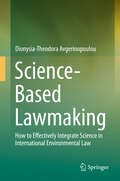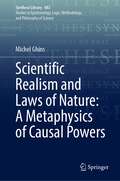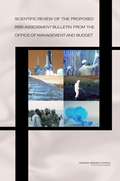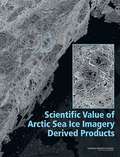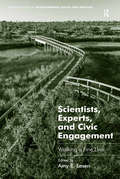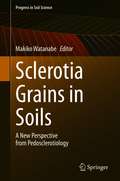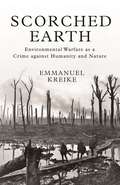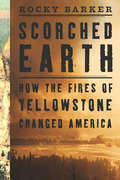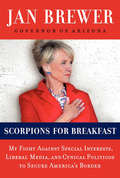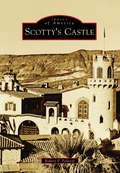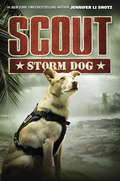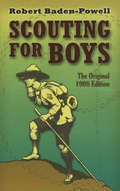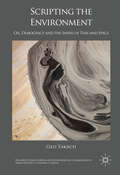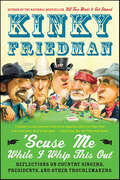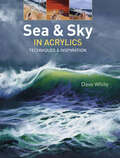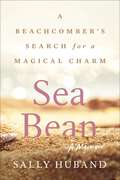- Table View
- List View
Science-Based Lawmaking: How to Effectively Integrate Science in International Environmental Law
by Dionysia-Theodora AvgerinopoulouThe Book takes the approach of a critique of the prevailing international environmental law-making processes and their systemic shortcomings. It aims to partly redesign the current international environmental law-making system in order to promote further legislation and more effectively protect the natural environment and public health. Through case studies and doctrinal analyses, an array of initial questions guides the reader through a variety of factors influencing the development of International Environmental Law. After a historical analysis, commencing from the Platonic philosophy up to present, the Book holds that some of the most decisive factors that could create an optimized law-making framework include, among others: progressive voting processes, science-based secondary international environmental legislation, new procedural rules, that enhance the participation in the law-making process by both experts and the public and also review the implementation, compliance and validity of the science-base of the laws. The international community should develop new law-making procedures that include expert opinion. Current scientific uncertainties can be resolved either by policy choices or by referring to the so-called „sound science.“ In formulating a new framework for environmental lawmaking processes, it is essential to re-shape the rules of procedure, so that experts have greater participation in those, in order to improve the quality of International Environmental Law faster than the traditional processes that mainly embrace political priorities generated by the States. Science serves as one of the main tools that will create the next generation of International Environmental Law and help the world transition to a smart, inclusive, sustainable future.
Science-Policy Interfaces in Global Environmental Governance: Myths, Challenges and Opportunities (SpringerBriefs in Political Science)
by Matteo De DonàThis Brief discusses science–policy interfaces (SPIs) in global environmental governance. Broadly speaking, SPIs can be understood as institutional arrangements that aim to bridge science and policy within a specific issue-area with a view to facilitating the solution of relevant societal problems. Although the scholarly literature on SPIs has grown substantially over the last two decades, there are still several myths and misconceptions about such bodies: these are often reflected in the practice of science–policy bridging within international organizations such as the United Nations. Offering an accessible discussion of the promises and pitfalls of SPIs, the book deliberately targets a hybrid audience, reaching out to both academics and practitioners. By reconstructing relevant theoretical debates across different scholarly fields, such as International Relations and Science and Technology Studies, and by taking stock of key hands-on experiences, this Brief connects the theory and practice of global SPIs, reflecting on the role of critical social science research as far as the interplay between science and policy in international environmental governance is concerned. On the basis of a balanced analysis of the strengths and shortcomings of global SPIs, this volume intends to provide readers with a faithful picture of the current international science–policy landscape as well as with an informed opportunity to evaluate these institutional arrangements’ potential for helping to address the global environmental challenges that the world is facing today.
Scientific Realism and Laws of Nature: A Metaphysics of Causal Powers (Synthese Library #483)
by Michel GhinsThis book addresses central issues in the philosophy and metaphysics of science, namely the nature of scientific theories, their partial truth, and the necessity of scientific laws within a moderate realist and empiricist perspective. Accordingly, good arguments in favour of the existence of unobservable entities postulated by our best theories, such as electrons, must be inductively grounded on perceptual experience and not their explanatory power as most defenders of scientific realism claim. Similarly, belief in the reality of dispositions such as causal powers which ground the natural necessity of scientific laws must be based on experience. Hence, this book offers a synthetic presentation of an original metaphysics of science, namely a metaphysics of properties, both categorical and dispositional, while at the same time opposing strong versions of necessitarism according to which laws are true in all possible worlds.The main theses and arguments are clearly presentedin a non-technical way. Thus, on top of being of interest to the specialists of the topics discussed, it is also useful as a textbook in courses for third year and more advanced university students.
Scientific Review Of The Proposed Risk Assessment Bulletin From The Office Of Management And Budget
by National Research Council of the National AcademiesRisk assessments are often used by the federal government to estimate the risk the public may face from such things as exposure to a chemical or the potential failure of an engineered structure, and they underlie many regulatory decisions. Last January, the White House Office of Management and Budget (OMB) issued a draft bulletin for all federal agencies, which included a new definition of risk assessment and proposed standards aimed at improving federal risk assessments. This National Research Council report, written at the request of OMB, evaluates the draft bulletin and supports its overall goals of improving the quality of risk assessments. However, the report concludes that the draft bulletin is "fundamentally flawed" from a scientific and technical standpoint and should be withdrawn. Problems include an overly broad definition of risk assessment in conflict with long-established concepts and practices, and an overly narrow definition of adverse health effects -- one that considers only clinically apparent effects to be adverse, ignoring other biological changes that could lead to health effects. The report also criticizes the draft bulletin for focusing mainly on human health risk assessments while neglecting assessments of technology and engineered structures.
Scientific Value of Arctic Sea Ice Imagery Derived Products
by National Research Council of the National AcademiesDuring the 1990s, a government program brought together environmental scientists and members of the intelligence community to consider how classified assets and data could be applied to further the understanding of environmental change. As part of the Medea program, collection of overhead classified imagery of sea ice at four sites around the Arctic basin was initiated in 1999, and two additional sites were added in 2005. Collection of images during the summer months at these six locations has continued until the present day. Several hundred unclassified images with a nominal resolution of 1 meter have been derived from the classified images collected at the 6 Arctic sites. To assist in the process of making the unclassified derived imagery more widely useful, the National Research Council reviewed the derived images and considered their potential uses for scientific research. In this book, we explore the importance of sea ice in the Arctic and illustrate the types of information--often unique in its detail--that the derived images could contribute to the scientific discussion.
Scientists, Experts, and Civic Engagement: Walking a Fine Line (Routledge Studies in Environmental Policy and Practice)
by Amy E. LesenHow do scientists, scholars, and other experts engage with the general public and with the communities affected by their work or residing in their sites of study? Where are the fine lines between public scholarship, civic engagement, and activism? Must academics 'give back' once they collect data and publish results? In this volume, authors from a wide range of disciplines examine these relationships to assess how they can be fruitful or challenging. Describing the methodological and ethical issues that experts must consider when carrying out public scholarship, this book includes a checklist for critical factors of success in engagement and an examination of the role of digital social media in science communication. Illustrated by a range of case studies addressing environmental issues (climate change, resource use, post-disaster policy) and education, it offers an investigation into the levels and ways in which scholars can engage, and how and whether academics and experts who engage in community work and public scholarship are acknowledged and rewarded for doing so by their institutions. Also bringing into the debate the perspective of citizens who have collaborated with academics, the book offers an exploration of the democratizing potential of participatory action research.
Sclerotia Grains in Soils: A New Perspective from Pedosclerotiology (Progress in Soil Science)
by Makiko WatanabeThis book introduces what sclerotia grains are, and where and how they exist in soils, by compiling the results obtained from the studies on fungal sclerotia formed by Cenococcum geophilum (Cg) and related species, the visible black small grains persistent for a few thousand to ten thousands of years in forest soils and sediments. The chapters contain the results and discussions on the ecological distribution and regulating factors, characteristics, and function of Cg sclerotia grains, carried out by researchers from soil geography, soil science, soil microbiology, physiology, forestry, analytical chemistry, environmental chemistry, material science, and related disciplines. The anatomy of sclerotia grains in soil was realized in terms of interdisciplinary joint researches, which resulted in deepening understanding of the ecological function of the mesoscale organic component in soils. This book covers the natural history of sclerotia in soils, pedo-sclerotiology.
Scorched Earth: Environmental Warfare as a Crime against Humanity and Nature (Human Rights and Crimes against Humanity #38)
by Emmanuel KreikeA global history of environmental warfare and the case for why it should be a crimeThe environmental infrastructure that sustains human societies has been a target and instrument of war for centuries, resulting in famine and disease, displaced populations, and the devastation of people’s livelihoods and ways of life. Scorched Earth traces the history of scorched earth, military inundations, and armies living off the land from the sixteenth to the twentieth century, arguing that the resulting deliberate destruction of the environment—"environcide"—constitutes total war and is a crime against humanity and nature.In this sweeping global history, Emmanuel Kreike shows how religious war in Europe transformed Holland into a desolate swamp where hunger and the black death ruled. He describes how Spanish conquistadores exploited the irrigation works and expansive agricultural terraces of the Aztecs and Incas, triggering a humanitarian crisis of catastrophic proportions. Kreike demonstrates how environmental warfare has continued unabated into the modern era. His panoramic narrative takes readers from the Thirty Years' War to the wars of France's Sun King, and from the Dutch colonial wars in North America and Indonesia to the early twentieth century colonial conquest of southwestern Africa.Shedding light on the premodern origins and the lasting consequences of total war, Scorched Earth explains why ecocide and genocide are not separate phenomena, and why international law must recognize environmental warfare as a violation of human rights.
Scorched Earth: How the Fires of Yellowstone Changed America
by Rocky BarkerWith vivid descriptions of the famous fires that have raged in Yellowstone, the heroes who have tried to protect it, and the strategies that evolved as a result, Barker draws us into the very heart of a debate over our attempts to control nature and people.
Scorpions for Breakfast: My Fight Against Special Interests, Liberal Media, and Cynical Politicos to Secure America's Border
by Jan BrewerSometime after dark on March 27, 2010, Arizona rancher Robert Krentz was found dead next to his four-wheeler on the grounds of his ranch on the Arizona-Mexico border. Krentz and his dog, Blue, had been missing since that morning. They were last heard from when he radioed his brother to say that he’d found an illegal alien on the property and was going to offer him assistance. The man Krentz encountered that day shot and killed him and his dog, without warning, before escaping to Mexico. It’s difficult to overstate the impact of Krentz’s death, which turned the issue of Arizona’s unsecured border—a crisis that the federal government had repeatedly ignored—into a national concern. As Arizona sheriff Larry Dever said in his testimony before the Senate Homeland Security Committee, “We cannot sit by while our citizens are terrorized, robbed, and murdered by ruthless and desperate people who enter our country illegally.” This momentum helped pass SB 1070, a bill that authorizes local law enforcement under certain conditions to question persons reasonably suspected of being illegal aliens, which Governor Jan Brewer and the state legislature had been working on for months. With the passage of this controversial bill, the state of Arizona became ground zero in the impassioned debate over illegal immigration. The Democrats and the media went into overdrive, denouncing the state and its governor as racists and Nazis.Governor Brewer, a lifelong Arizona resident with deep ties to the community, was first elected to the Arizona House of Representatives in 1982, and hasn’t lost an election since. As a state official, she watched with increasing dismay as illegal immigration exploded across Arizona’s border, and noticed the devastating effect it was having on the state. Causing an escalation in violence, an influx of drugs, and prisons and hospitals to fill to overflowing, this problem was not only wreaking havoc on the moral fabric of the community but placing an even greater strain on Arizona’s beleaguered health, educational, and social welfare networks. Growing frustrated with the failure of the federal government to respond to her pleas for assistance, Governor Brewer led the state to action. Scorpions for Breakfast is Brewer’s commonsense account of her fight to secure our nation’s border in the face of persistent federal inaction. Her book is vital reading for all Americans interested in the real change that can happen when local leaders take the initiative to preserve our country and our laws.
Scotty's Castle
by Robert P. PalazzoScotty's Castle is a study in contrasts, much like its setting in Death Valley. While the castle is known worldwide and has been visited by hundreds of thousands of tourists, many myths persist. It is not a castle, nor was it owned by Walter E. Scott, known as "Death Valley Scotty." But the Spanish-style hacienda, also known as Death Valley Ranch, has always been linked to Scott. This book explores the fascinating history of Death Valley Scotty, Albert and Bessie Johnson (the true owners and builders of the castle), and the castle itself from construction to private living quarters to a tourist facility owned and operated by the National Park Service.
Scoundrel
by Bernard CornwellFrom the incomparable New York Times bestselling master of gripping adventure, Bernard Cornwell, comes a relentlessly suspenseful contemporary thriller set in the lethal world of international terror.Bostonian Paul Shanahan is many things: part-time marine surveyor, smuggler, gunrunner, suspected CIA agent. A full-time scoundrel with ties to nothing and no one--except to an ex-lover who died years before in a hail of bullets--he has agreed to transport five million dollars in gold across the ocean by sailboat, money earmarked by the Irish Republican Army for the purchase of fifty-three Stinger missiles. Shanahan's instincts are telling him there's more to this deal below the surface and that he's not meant to survive after delivery. But, if he can elude British Intelligence and several terrorist organizations' most efficient killers--and with only his life left to lose--$5 million might just be enough to get a desperate rogue out of the game for good.
Scout: Fire Fighter (Scout #2)
by Jennifer Li ShotzThe second installment of the action-packed Scout series, from the #1 New York Times bestselling author Jennifer Li Shotz.It’s official: Scout is now a K9 in the National Guard. But being a certified hero means Scout has his job cut out for him. He needs to work even harder to protect his country and his human best friend, Matt. When Matt’s classmates get trapped in a raging wildfire, Matt knows that only Scout can track them down and bring them back safely. But when Matt’s dad, a First Sergeant home on leave, gets wind of their plan, he insists on joining the rescue mission.Can the heroic team save Matt’s friends from the dangerous fires before time runs out? This fast-moving tale of Scout the hero dog will grab even reluctant readers and is perfect for fans of Cracker!, Max, and Hero.
Scout: National Hero (Scout #1)
by Jennifer Li ShotzFrom the #1 New York Times bestselling author Jennifer Li Shotz comes a whole new dog adventure full of courage and canine friendship. <P><P>Scout, once a stray puppy with a troubled past, has grown into one of the best search-and-rescue dogs in Mississippi. <P><P>And now he’s ready for bigger and better things: Scout is joining the National Guard. But Scout’s new life as a K9 recruit is far from easy as he adjusts to his challenging training and a brand-new family. <P><P>Twelve-year-old Matt is determined to help Scout feel at home in Nevada, but when a terrifying flash flood hits town, the pair must save the day and prove their worth. <P><P>As Scout and Matt team up to survive treacherous rising water, lead victims to safety, and attempt to rescue Matt’s sister, they quickly learn that bravery is just the first ingredient in the making of a hero. Does the duo have what it takes to protect their town from the fallout of this devastating disaster? <P><P> Perfect for fans of Max, Hero, and Cracker!
Scout: Storm Dog (Scout #3)
by Jennifer Li ShotzThe adventure continues in the third installment of the action-packed Scout series, from the #1 New York Times bestselling author Jennifer Li Shotz.Scout, a National Guard dog, was born to be a hero. When Scout and his 12-year-old owner, Matt, land in Puerto Rico after a devastating hurricane, they want to help. The pair befriend Luisa, who knows all about the Sato dogs—abandoned pups who need food and shelter. Scout and Matt decide to foster an injured dog named Rosita. But Rosita is clearly searching for something and runs off into the rainforest. Now it’s up to Scout, Matt and Luisa to find the missing dog and bring her back safely. Surviving the dangers of the wilderness will be far from easy, but Scout and Matt make an excellent team.This fast-moving tale of Scout the hero dog will grab even reluctant readers and is perfect for fans of Cracker!, Max, and Hero.
Scout: The Boy Scout Handbook, A Guide to Adventure, A Guidebook for Life
by Boy Scouts of AmericaThe official Boy Scouts of America handbook.
Scouting for Boys: The Original 1908 Edition
by Robert Baden-PowellWritten by Robert Baden-Powell, Lieutenant General in the British Army and founder of the international Scouting movement, Scouting for Boys is one of the most influential manuals for youth ever published. First printed in 1908, it remains an all-time bestseller in the English-speaking world, second only to the Bible. The original blueprint and "self-instructor" of the Boy Scout Movement, Scouting for Boys is a fascinating fusion of "yarns and pictures," an irresistible mixture of nationalistic narrative, tracker legend, and quotations from Baden-Powell's own autobiography and the popular adventure fiction of Rudyard Kipling, James Fenimore Cooper, and Alexander Dumas. The book provides practical advice on lighting fires, building boats and stalking animals, alongside proper Victorian-era education on chivalry and manners, self-discipline and improvement, and above all, good citizenship. Expounding upon the topics intrinsic to the life of a scout -- tracking, woodcraft, camp life, endurance, patriotism, and more -- this classic is essential for anyone interested in popular culture and the history of scouting and youth education. Ninety original diagrams and illustrations enhance the text.
Scouts BSA Handbook
by Boy Scouts of AmericaThe 14th Edition of the Scouts Handbook is the go-to book for every Scout. Featuring updated images and design for 2019, this edition offers more information than ever before, including additional information pertaining to: service at all ranks, healthy eating habits, requirements, physical fitness at each rank, outdoor ethics, weather safety, risk assessment/mitigation and requirements incorporating Duty to God to show Scout Spirit.
Scouts BSA Requirements
by Boy Scouts of AmericaThis updated edition of Boy Scouts Requirements details the official requirements for the Boy Scouts of America by providing the latest rank and merit badge requirements.
Scripting the Environment
by Geo TakachThis volume explores how to engage audiences both beyond and within the academy more deeply in environmental research through arts-based forms. It builds on a multi-pronged case study of scripts for documentary film, audio-visual and stage formats, focusing on how the identity of a place is constructed and contested in the face of environmental concerns around fossil-fuel extraction in a globalized, visual society--and specifically on the rising, international public-relations war over Alberta's stewardship of the tar sands. Each script is followed by discussion of the author's choices of initiating idea, research sources, format, voices, world of the story, structure and visual style, and other notes on the convergence of synthesis, analysis and (re)presentation in the script. Included are lively analysis and commentary on screenwriting and playwriting theory, the creation and dissemination of the scripts, and reflections to ground a proposed framework for writing eco-themed scripts for screen, audio-visual and stage formats.
Scuba Diving: Merit Badge Series
by Boy Scouts of AmericaA guide to completing the SCUBA diving merit badge for Boy Scouts.
Scuse Me While I Whip This Out: Reflections on Country Singers, Presidents, and Other Troublemakers
by Kinky FriedmanKinky Friedman is back, and with 'Scuse Me While I Whip This Out he gets it on with all manner of egos. In this collection of twisted takes on life, the Kinkster gives us funny, irreverent, and insightful looks at outsized personalities from people he's known, like Bill Clinton, George W., Willie Nelson, and Bob Dylan -- not to mention Joseph Heller and Don Imus -- to people he's known in spirit, such as Moses, Jesus, Jack Ruby, and Hank Williams. With his meditations on subjects ranging from sleeping at the White House, marriage, his pets, fishing in Borneo, country music, and cigars to the tribulations of possessing talent, Kinky doesn't deny us the "flashes of brilliance and laugh-out-loud observations" (Rocky Mountain News) that are present in all his other work. Hilarious, irreverent, and passionately twisted, 'Scuse Me While I Whip This Out reads as if it were written by a slightly ill modern-day Mark Twain.
Se-Quo-Yah
by George Everett FosterPublished in 1885, this is the biography of famed Cherokee Indian, Se-Quo-Yah, the inventor of the Cherokee alphabet.
Sea & Sky in Acrylics: Techniques & Inspiration
by Dave WhiteA pro shares his techniques for painting stunning seascapes, with three step-by-step projects included.Painting teacher Dave White introduces the simple but effective techniques that he uses to paint stunning, dramatic seascapes with beautiful and realistic skies. He demonstrates spattering, blending backgrounds, painting horizons, finger painting clouds and foam. There is expert advice on the anatomy of waves and how they rise and collapse, creating ripples, surf, foam, and spray. In addition, clear instructions show how to paint effective reflections and beaches to improve your seascapes. The sky section shows effective techniques for painting all types of cloud, with some innovative methods such as tipping up the surface to let dilute paint run, to create cirrus clouds. Dave’s method of creating depth in sea, beach, and sky using lines projected from the vanishing point can radically improve your seascapes. You’ll also find a section on moods and sunsets, full of beautiful, dramatic examples. Finally, three step-by-step projects show how to paint a beach panorama with a rolling wave, a spectacular sunset over a calm sea, and waves crashing on rocks.
Sea Bean: A Beachcomber's Search for a Magical Charm—A Memoir
by Sally Huband“Sea Bean is a coastal treasure. Its hard-won attentiveness shows the wonder and vulnerability of our interconnected oceans, wildlife, and people. In Sally's writing, beachcombing—an old island pursuit—is modern, revealing and restorative. The next time I am at the shore I will have a deeper appreciation and curiosity."—Amy Liptrot, author of The Outrun and The InstantA Waterstones Nature and Travel Best Book of 2023Winner of the Highlands Book Prize 2023Longlisted for the Wainwright Nature PrizeA powerful journey of sea and self, trial and hope on the islands of Shetland, where climate change is making marked impacts on the natural world.When a seed falls from a vine in the tropics and is carried by ocean currents across the Atlantic to the shores of Western Europe, it is known as a sea bean. It’s long been lucky to find a sea bean upon the shore; these seeds have been collected and used as magical charms for more than a thousand years.Sally Huband's search for the elusive sea bean begins shortly after she moves to the windswept archipelago of Shetland, the northernmost region of Great Britain, situated between the Atlantic Ocean and the North Sea. When pregnancy triggers a chronic illness and forces her to slow down, Sally turns to the beaches for solace and wellbeing. There, she discovers treasure freighted with story and curiosities that connect her to the world.The wild shores of Shetland offer glimpses of orcas swimming through the ocean at dusk, the chance to release a tiny storm petrel into the dark of the night, and a path of hope. This beachcombing path takes her from the Faroese archipelago to the Orkney islands, and the Dutch island of Texel. It opens a world of ancient myths, fragile ecology, and deep human history. It brings her to herself again.Sea Bean is a like a message in a bottle. It reveals the interconnection of our oceans, our communities, and ourselves, and offers both comfort and an invitation to feel belonging when we are adrift.
